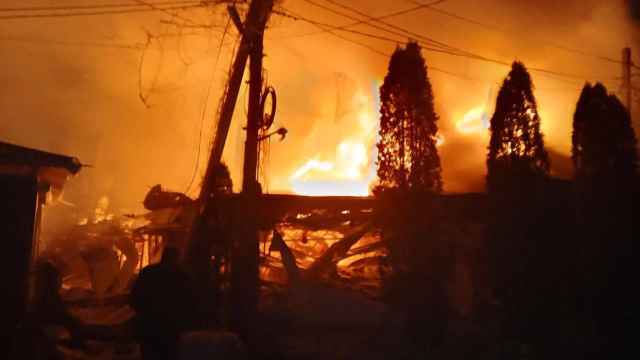Troubled crude producer TNK-BP was the main driver behind Russia's oil-output growth in May as a result of production ramp-up at new fields, Energy Ministry data showed Saturday.
Russian total oil output, the world's largest, inched up 0.1 percent to 10.34 million barrels per day in May from 10.33 million bpd in April. This was still below the post-Soviet record high of 10.36 million bpd registered in the first three months of the year.
The May figure was higher than the 10.10 million bpd produced by Saudi Arabia, the world's second-largest crude producer, which increased output last month despite a drop in oil prices.
In tons, the ministry said crude production in Russia stood at 43.74 million last month.
Oil production at TNK-BP, which accounts for almost a third of BP's output, increased almost 0.5 percent in May, month on month, on the back of a 2.3 percent output rise at the remote Verkhnechonsk field in eastern Siberia.
Production at greenfield operations such as Verkhnechonsk reached 16 percent of TNK-BP's total output in the first quarter, compared with 11 percent a year earlier.
Still, sustained oil-production growth at Russia's third-largest oil producer is vulnerable as a result of the spat between BP and the consortium of Soviet-born billionaires that owns the other half of TNK-BP.
In the latest twist in the dispute, BP said Friday that it will look to sell its shareholding in TNK-BP after the British oil major received unsolicited indications of interest in its stake.
Russian companies have been focusing on greenfield production as old deposits, located predominately in western Siberia, are increasingly depleted.
The Russian government aims to sustain crude production — a key source of government revenue in the energy-reliant economy — at not less than 10 million bpd.
It recently introduced some tax relief for oil output at the Arctic offshore deposits, whose huge untapped riches are seen as the main supplier of hydrocarbons in 10 to 20 years.
Daily gas production in Russia continued to slide, falling to 1.67 billion cubic meters in May from 1.87 bcm in April.
Gas output at Gazprom, the world's top natural gas producer, tumbled almost 13 percent. Earlier this week, Alexei Miller, the company's head, said the crisis in the eurozone is hurting demand for gas.
A Message from The Moscow Times:
Dear readers,
We are facing unprecedented challenges. Russia's Prosecutor General's Office has designated The Moscow Times as an "undesirable" organization, criminalizing our work and putting our staff at risk of prosecution. This follows our earlier unjust labeling as a "foreign agent."
These actions are direct attempts to silence independent journalism in Russia. The authorities claim our work "discredits the decisions of the Russian leadership." We see things differently: we strive to provide accurate, unbiased reporting on Russia.
We, the journalists of The Moscow Times, refuse to be silenced. But to continue our work, we need your help.
Your support, no matter how small, makes a world of difference. If you can, please support us monthly starting from just $2. It's quick to set up, and every contribution makes a significant impact.
By supporting The Moscow Times, you're defending open, independent journalism in the face of repression. Thank you for standing with us.
Remind me later.





